Winter Semester Events, 2024—25
[Sept_Event]
Future Developments of Digital Humanities and Didactics in Global Ancient Studies
by Prof. Dr. Sven Günther
In recent years, digital humanities as well as didactics have come into the focus of global ancient studies as important methodologies and skills for conducting and promoting innovative research, sustainable teaching, and public outreach. Concluding the project “Craveler / Copter”, funded by the Volkswagen Foundation at the University of Tübingen, Germany and the Institute for the History of Ancient Civilizations (IHAC) of Northeast Normal University for the period 2019–2024, the two-day workshop gathered scholars from the fields of Ancient Studies (Ancient History, Archaeology, Classical Philology, Numismatics), Didactics, and Digital Humanities (DH) in order to promote the interdisciplinary discourse about the proper application of digital humanities methodologies and tools both to university and school teaching; a topic that still offers much potential.[1]
After a welcome address by IHAC director Qiang Zhang, the workshop organiser and IHAC vice-director SVEN GÜNTHER (Changchun) shortly outlined few key questions to the topic of DH methodologies and applications in ancient studies and their didactics from a practical teaching perspective: while the FAIR principles (findability, accessibility, interoperability, and reusability)[2] in DH could adequately describe the framework of digital humanities the didactical and also pedagogical side of school and university teaching in history requires in addition a proper historical methodology and morale which – following Johann Gustav Droysen’s “Outline of the Principles of History” (“Grundriss der Historik”) – consists of description of historical material as well as its analytical and interpretative handling; which all three combined form the basis for performance and assessment standards. Hence, also DH applications in the classroom of ancient studies should pay close attention to a) defining the didactic goals; b) addressing the issues of inclusions and inner differentiation; c) balancing out the right degree of immersion and critical reflection; and d) formulating a sustainable performance assessment in order to comprehensively integrate DH methodologies and approaches into historical disciplines, thereby enriching the latter’s traditional bases.
The keynote by CLAUDIA SODE (Cologne) showed how a relatively small discipline such as Byzantine Studies can benefit from DH. With the example of DigiByzSeal[3] she outlined one way in which research, teaching, and outreach can have multiple impact on the academic community and a broader intellectual public. She especially emphasized the cross-disciplinary opportunities as well as the multi-faceted results in form of academic research value, publication output, training of skills for the future job market, all of which, vice-versa, could ensure further funding. The following paper by MARTINA FILOSA (Cologne) deepened her predecessor’s focus by analyzing pioneering digital projects in Byzantine Studies and their impact on different concepts and discourses of this discipline. She then outlined the main principles and concepts of Digital Byzantine Studies, a project that aims to build a sustainable digital infrastructure for research-based teaching in this discipline.[4] In the following Q/A session, specifics of DH tools as well as practical issues such as measuring students’ performance and the different ways of learning how to deal with material culture from the past were addressed.
Afterwards PÉTER KATÓ (Budapest) examined the extent to which online databases have gained momentum in Ancient Greek Epigraphy. In particular, he stressed that the comprehensiveness, completeness, and reliability as well as reusability and sustainability of the data are still at times questionable and called for a critical education of both students and young researchers. Questions tackled the issue of the right balance between traditional methods in epigraphic studies, namely, the critical edition and autopsy of the material as well as the potential of digital publications for studying the entanglement of inscription, image, monument, and contextual setting, being still a research lacuna that currently seems very promising for future research results.
HENDRIKUS VAN WIJLICK (Beijing) offered insights into his course on building a comprehensive timeline of ancient evidence for specific periods of Ancient Greek and Roman History. The detailed preparation, instruction, and assessment of students’ activities within the project, the challenges of pandemic times, and the practical issues of, for instance, feasible programs and databases available for conducting such student-focused project were critically reflected on. The following discussion mainly focused on the practical issues and the ways different departments (e.g., of History, Education, and IT) could cooperate for easing such project seminars.
The first workshop day was concluded by LOTHAR WILLMS (Berlin/Heidelberg) who presented his project of a connected Etymological Online Dictionary (LEDI = Lexicon Etymologicum Digitale Indoeuropaeum)[5] in order to enable students of Classical Philology to trace historical developments of words and word roots from antiquity to modernity. This nowadays in ancient studies rarely taken linguistic approach started from his own introductory book on this topic, which was then turned into an easy-to-search-and-view database which, however, needs further modifications and additions in order to become most comprehensive. In the final question session, the ways of ensuring import of and interoperability with other databases or text treasuries such as the various online dictionaries, academic OCR digitization projects or Google Books were discussed.
The next day under the auspices of the Consul General of the Federal Republic of Germany Shenyang, HENDRIK BARKELING (Shenyang), was dedicated to games and gamification in teaching of ancient studies. SEBASTIAN HAGENEUER (Cologne) emphasized the chances of teaching important principles, concepts, and issues of archaeological studies through Archaeogaming, namely, by guiding students to create video games. In particular, he discussed several sample games[6] of previous courses and the various forms they addressed archaeological topics: e.g., ethical questions during field work, cracking stereotypes about archaeologists, or museum and provenance issues. In the Q/A session the degree to which students from the different disciplines involved (DH, digital archaeology, traditional archaeologies) learned about the other fields was enquired as well as potential ways to insert critical reflections on the own disciplines into games; moreover, how the metadata produced by students in their course work could be used to evaluate the efficiency and effectiveness of instruction.
KEVIN KÖRNER (Tübingen) followed with several projects conducted for making museum exhibitions ready for extended reality experiences. After a short introduction to the different forms and degrees of immersion regarding extended (vulgo: virtual) realities (XR), he showed examples created via ExPresS-XR[7] and discussed commonly addressed issues such as costs, outreach, and XR sickness. Further questions arose about the relation of individual and collective experiences in real and XR exhibitions and the best practices to ensure multi-sensual stimulations in XR-created environments.
At last, STEFAN KRMNICEK (Tübingen) talked about several numismatic games developed in courses at his department, one in cooperation with IHAC, funded by the Volkswagen Foundation.[8] He especially emphasized the double didactic character of these so-called serious games, namely, to instruct students in topics of the small discipline of Numismatics and to provide a broader public with easy-to-learn platforms through funny, gamified tasks. In the discussion, a third feature, namely, to teach students to design didactically profound and fun-generating content and play environments was outlined.
The final discussion was opened by a short summarizing statement of SVEN GÜNTHER (Changchun) who stressed the communicative chances and challenges of digital methods in the didactics of ancient studies. The formation of historical narratives and the critical reflection on thinking-in-boxes as sometimes generated and continued by database structures or gamification approaches, in particular once commercial interests are involved were for him key themes that future research should address. The participants agreed on the difficult balance between immersion into the digital world(s) and necessary simplification of teaching and learning content. Furthermore, issues arising when transferring and transforming knowledge from one to another medium and didactic aim were emphasized. Overall, the importance of integrating DH methodologies and approaches into the respective disciplines in critical manner was acknowledged, as both the chances and limits of the digital world should be critically accompanied by the Humanities, based on qualitative but in the future hopefully also more quantitative data generated from the user data available but largely unused so far.[9]
Conference overview:
Qiang Zhang (Changchun): Welcome address
Sven Günther (Changchun): Thematic introduction
Keynote
Claudia Sode (Cologne): Research-based teaching and Digital Humanities from the Perspective of a ‘Small Discipline’
Martina Filosa (Cologne): Digital Byzantine Studies in Theory and Practice
Péter Kató (Budapest): Greek Epigraphic Databases: Scope, Structure and Practical Use
Hendrikus van Wijlick (Beijing): Constructing Databases and Timelines of Ancient Evidence
Lothar Willms (Berlin/Heidelberg): The Project of a Connective Etymological Online Dictionary: New Perspectives for Etymological Research and Outreach in the Digital Age
Sebastian Hageneuer (Cologne): Archaeogaming: Teaching about Archaeology by Creating Video Games
Kevin Körner (Tübingen): ExPresS-XR. Virtual Applications for Museum Exhibitions
Stefan Krmnicek (Tübingen): Numismatic Games. Teaching through Gaming
Final discussion
Notes:
[1] For didactic background and teaching in digital archaeology, see, e.g., Elisabeth Günther et al., NEUES SEHEN – Aktuelle Ansätze der Digitalen Archäologie in der Objekt- und Bildwissenschaft. Teil 1/4: Digitale Archäologie in der universitären Lehre, in: Digital Classics Online 9, 2023, URL: https://journals.ub.uni-heidelberg.de/index.php/dco/article/view/94357 (3.10.2024).
[2] On these principles, see: https://www.go-fair.org (3.10.2024).
[3] Project URL: https://ifa.phil-fak.uni-koeln.de/forschung/byzantinistik-und-neugriechische-philologie-forschung/drittmittel-projekte/digibyzseal (3.10.2024).
[4] Project URL: https://ifa.phil-fak.uni-koeln.de/forschung/byzantinistik-und-neugriechische-philologie-forschung/drittmittel-projekte/dibs-digital-byzantine-studies (3.10.2024).
[5] Project URL: https://etymologie.skph.uni-heidelberg.de (3.10.2024).
[6] See: https://archaeologie.phil-fak.uni-koeln.de/en/institut/fachgebiete/archaeoinformatik/archaeogaming/games-summer-2022 (3.10.2024)
[7] See: https://github.com/eisclimber/ExPresS-XR (3.10.2024).
[8] Project URL: https://uni-tuebingen.de/fakultaeten/philosophische-fakultaet/studium/studienorientierung/masterprofile/masterprofil-digital-humanities/forschungsprojekte/craveler-numismatics-through-space-and-time (3.10.2024).
[9] The issue of so-far missing quantitative data on the (selection processes for the) formation of individual, collective and cultural memories was already addressed at the IHAC workshop on Chinese-European Objects of Memory, see conference report on H-Soz-Kult: https://www.hsozkult.de/conferencereport/id/fdkn-141861 (3.10.2024).
First Release & Further notice:
Sven Günther, Tagungsbericht: Future Developments of Digital Humanities and Didactics in Global Ancient Studies, in: H-Soz-Kult, 08.11.2024, https://www.hsozkult.de/conferencereport/id/fdkn-151035.
Copyright (c) 2024 by H-NET, Clio-online and H-Soz-Kult, and the author, all rights reserved. This work may be copied and redistributed for non-commercial, educational purposes, if permission is granted by the author and usage right holders. For permissions please contact hsk.redaktion@geschichte.hu-berlin.de.
Poster
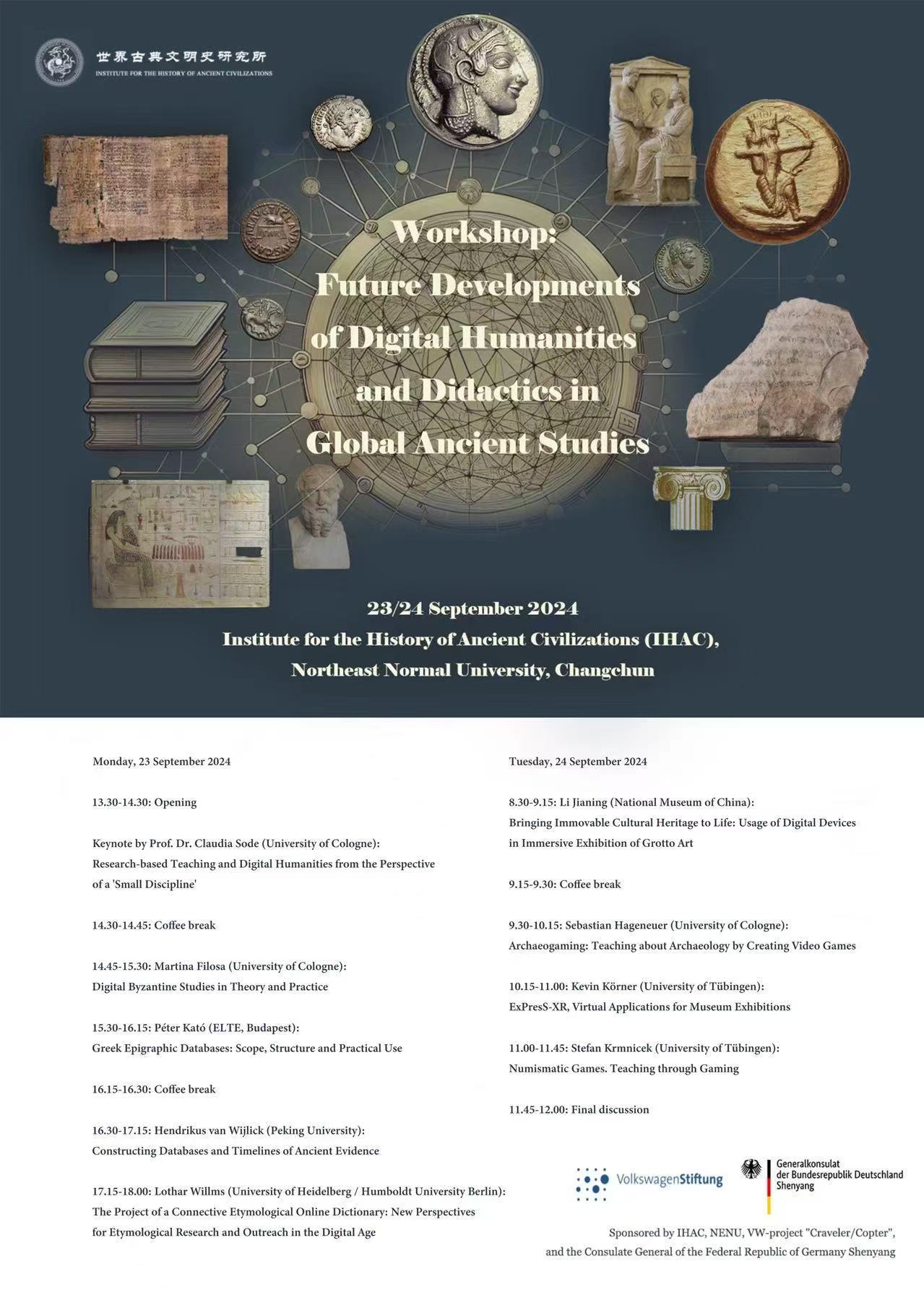
Speakers
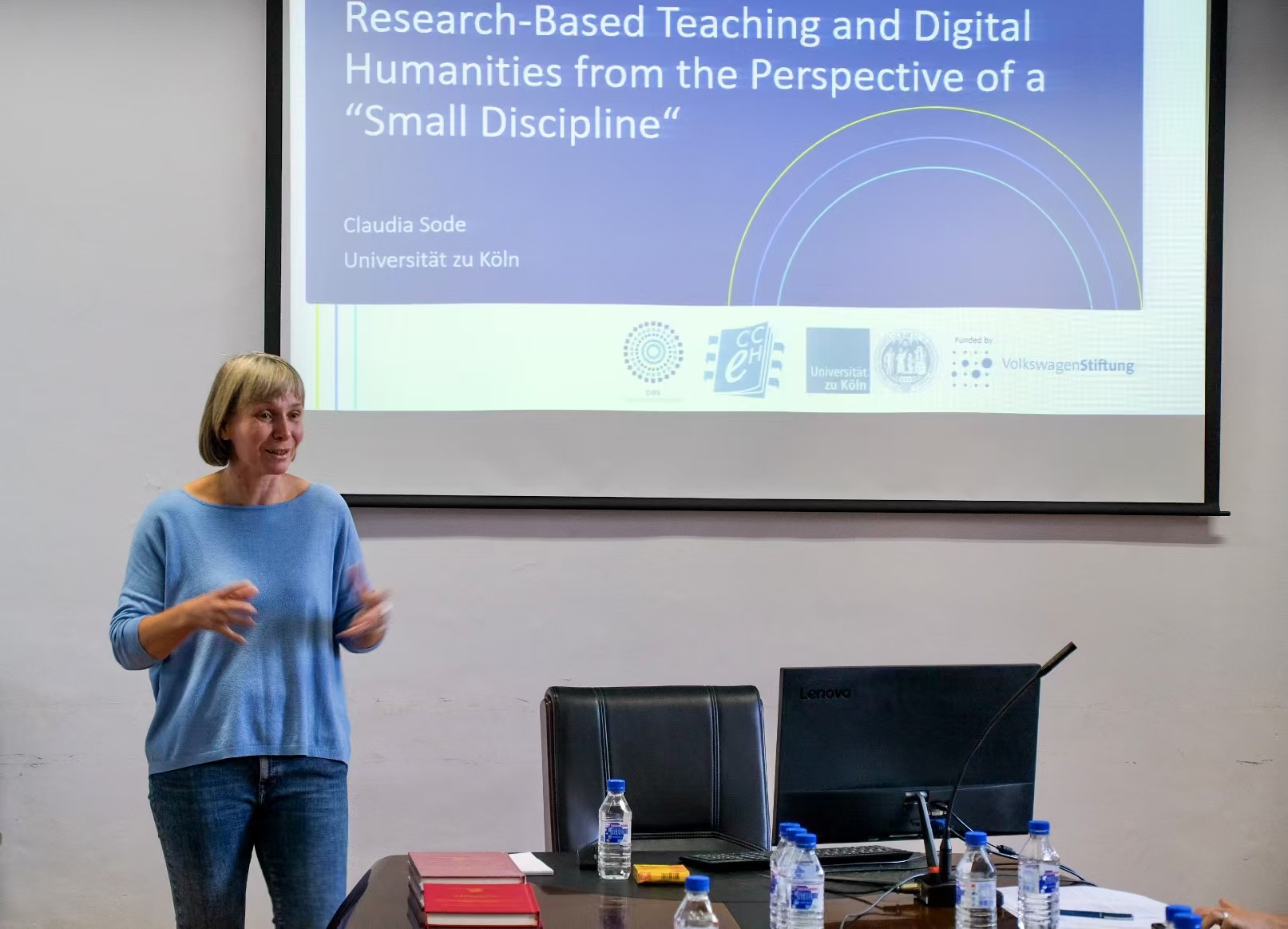
Prof. Dr. Claudia Sode
University of Cologne
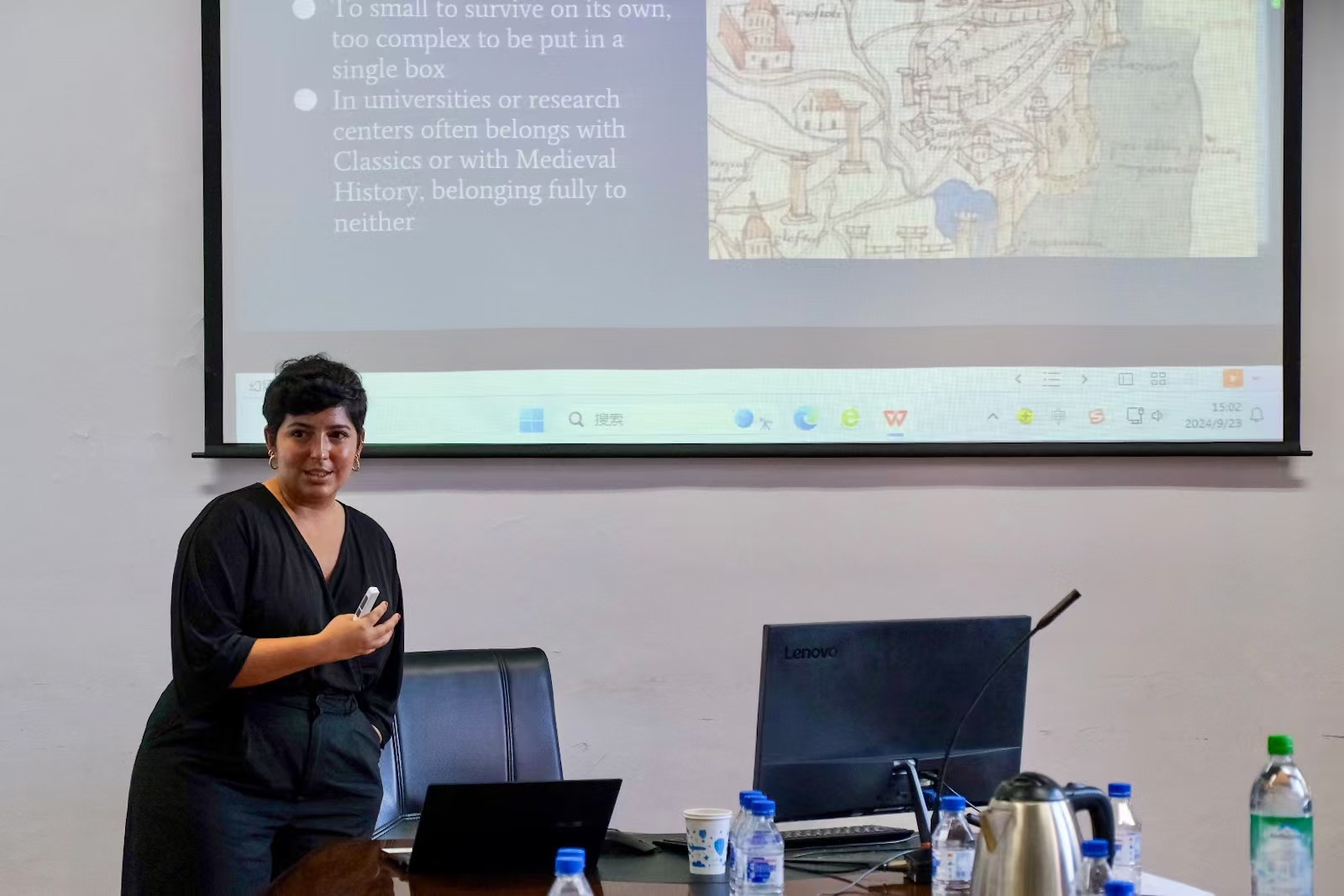
Dr. Martina Filosa
University of Cologne
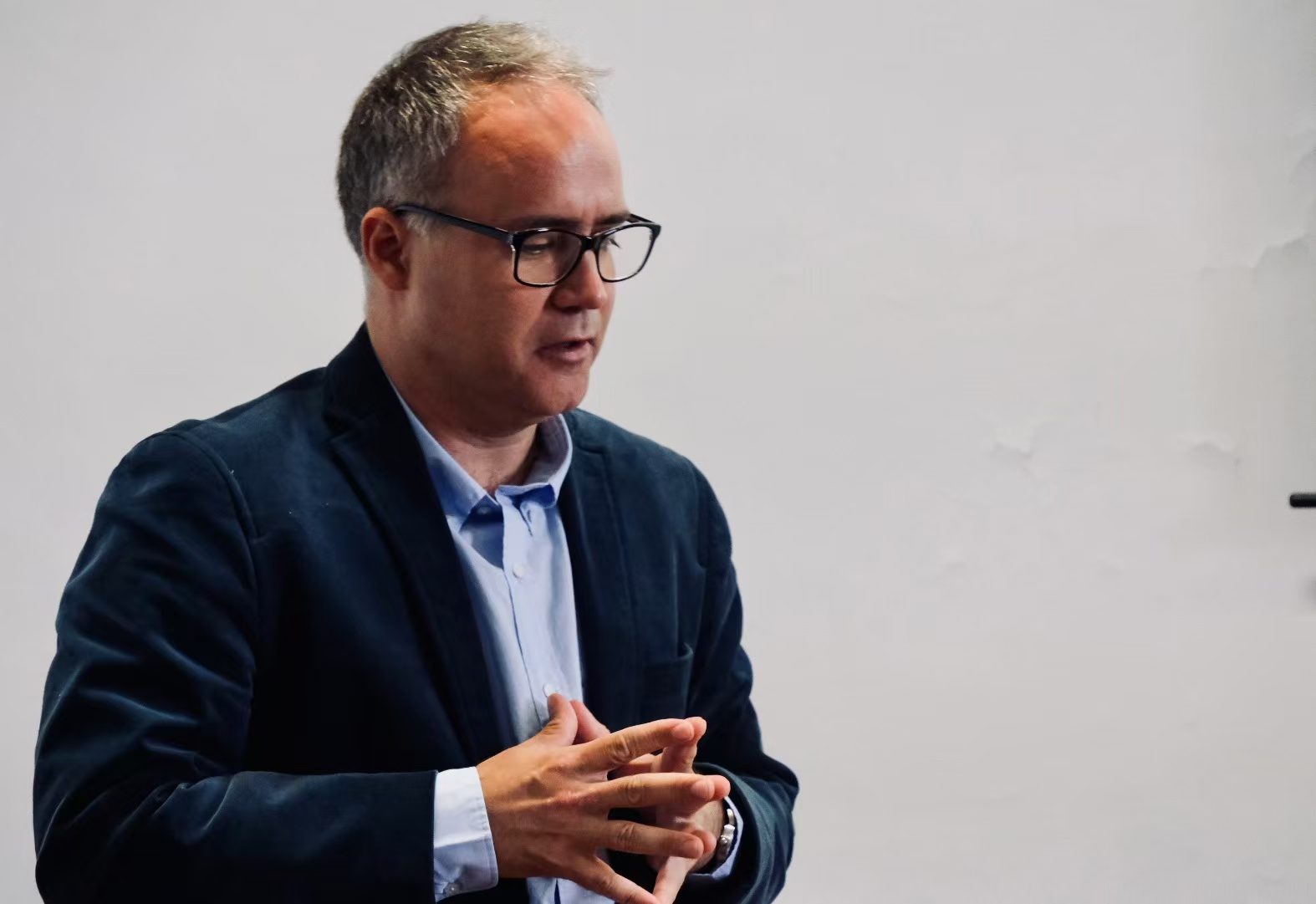
Dr. Péter Kató
ELTE, Budapest
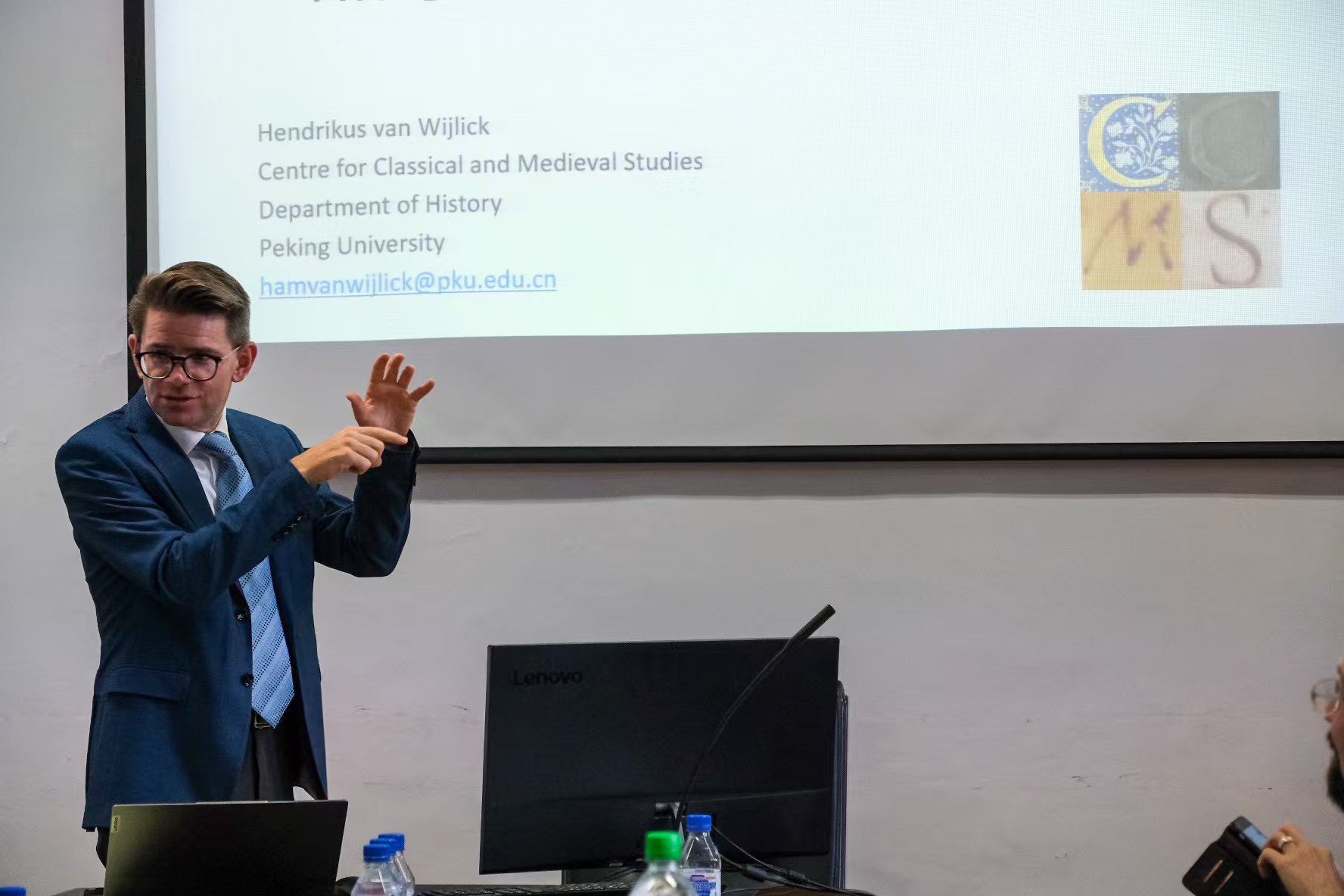
Assoc. Prof. Dr. Hendrikus van Wijlick
Peking University
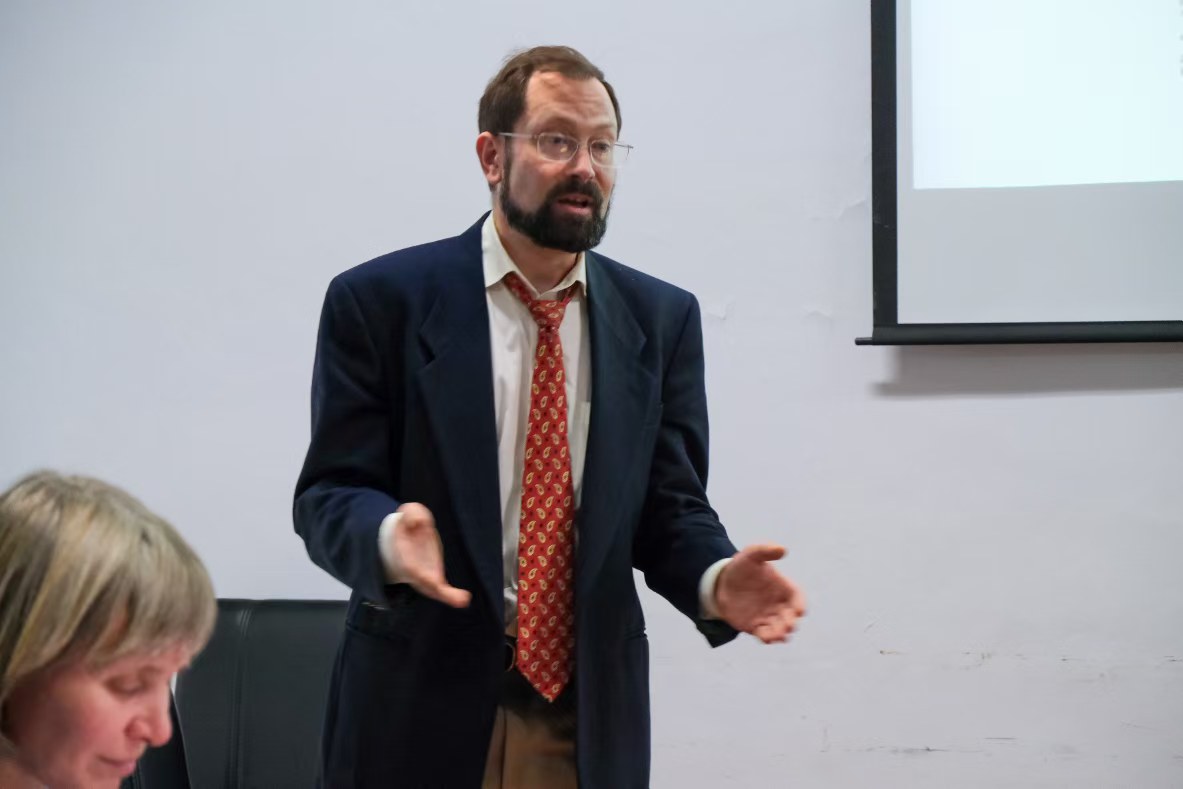
PD Dr. Lothar Willms
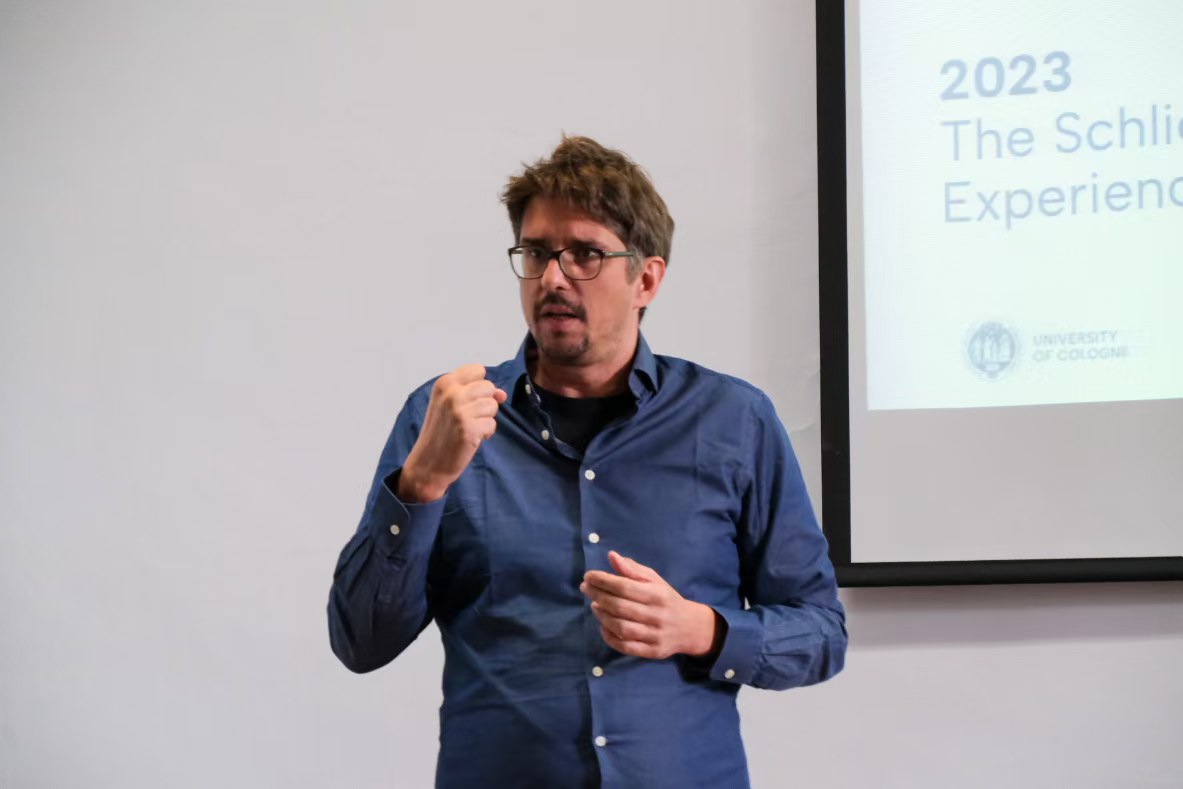
Dr. Sebastian Hageneuer
University of Cologne
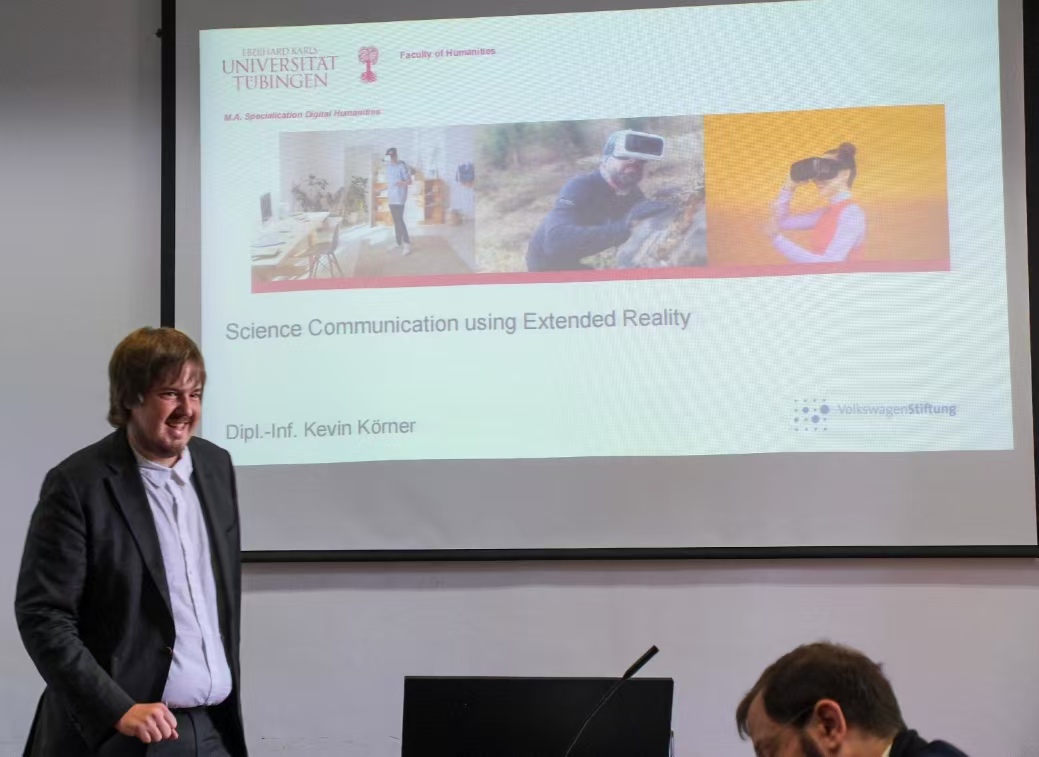
Dipl. -inf. Kevin Körner
University of Tübingen
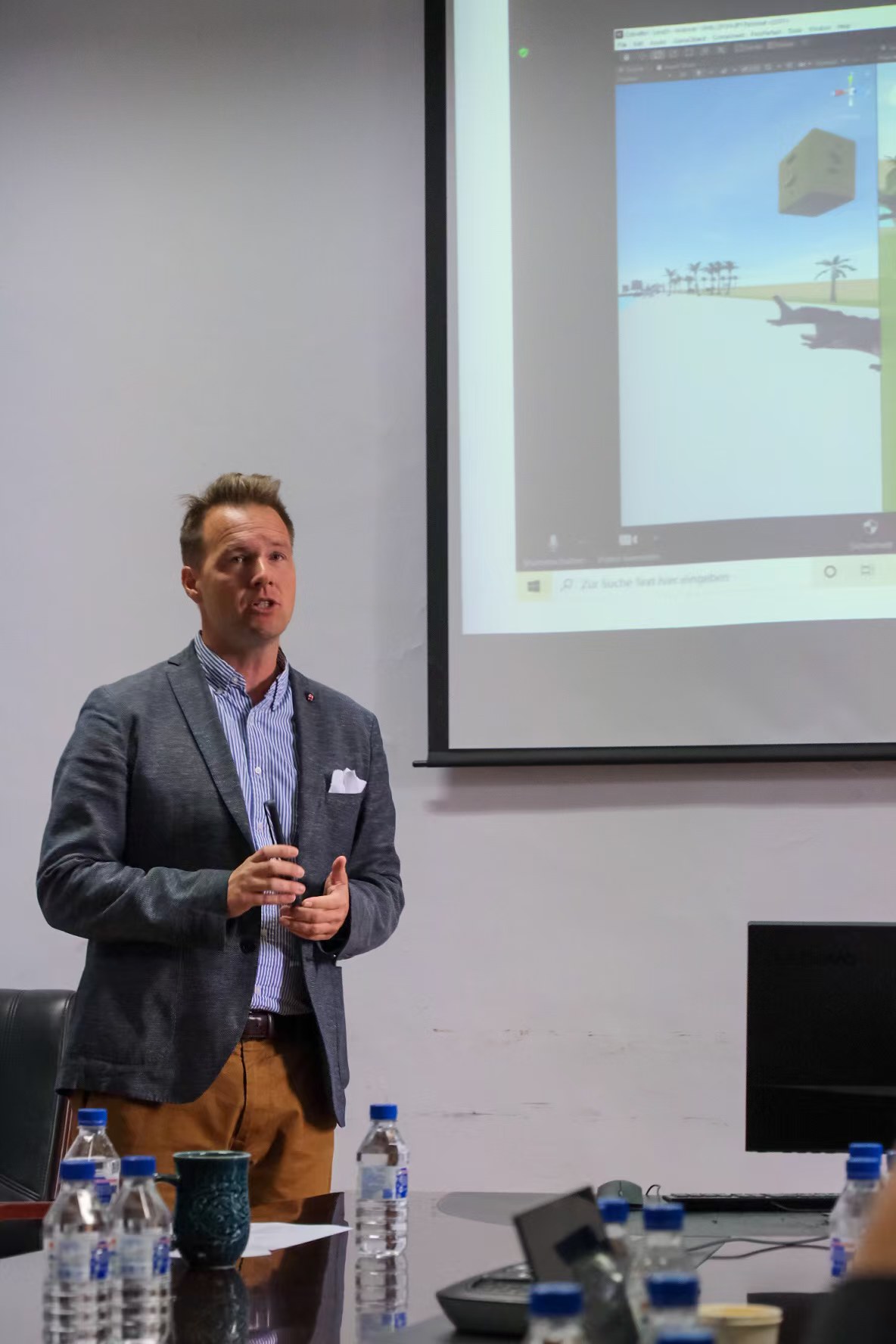
Dr. Stefan Krmnicek
University of Tübingen
Representatives
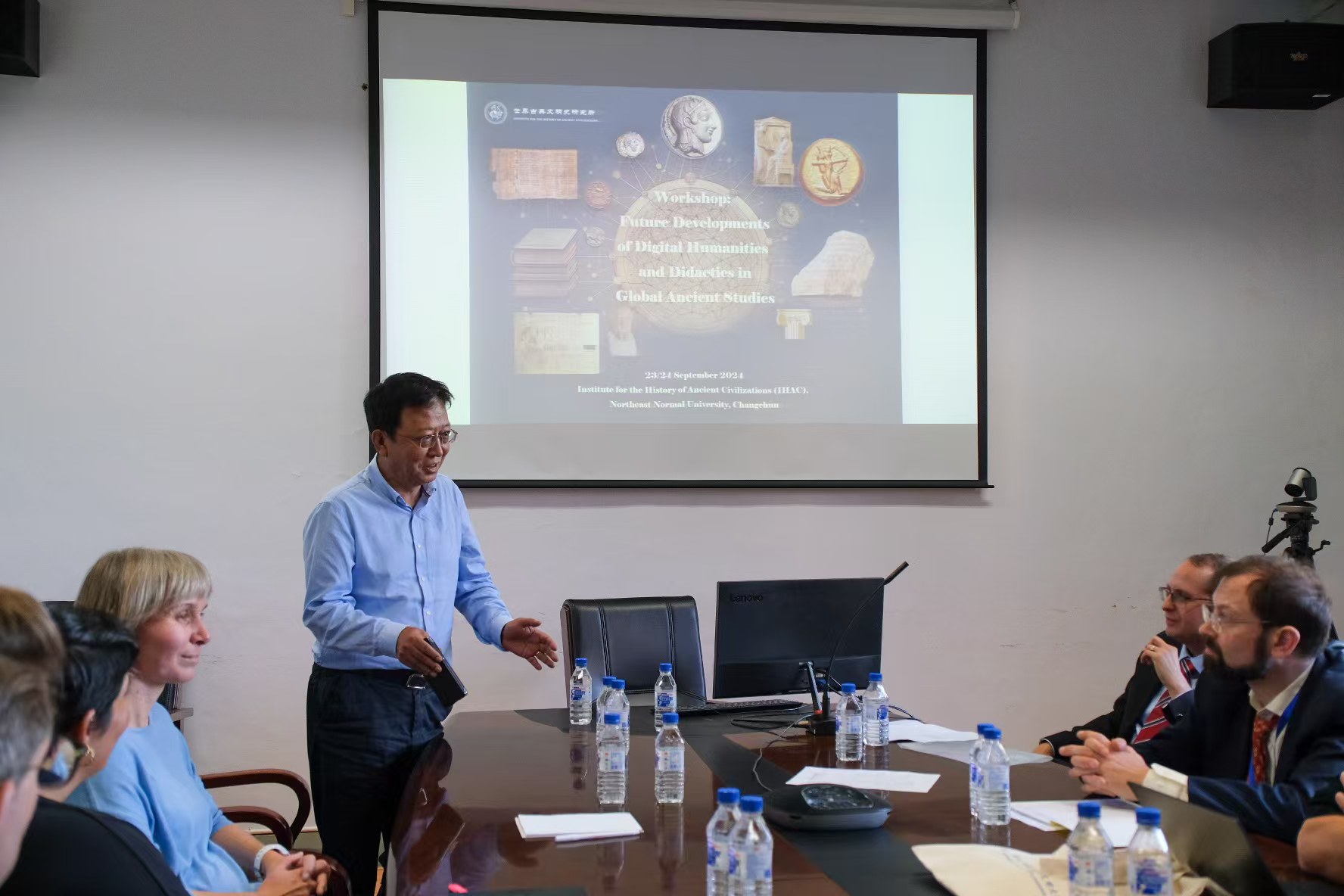
Prof. Dr. ZHANG Qi
Director of IHAC
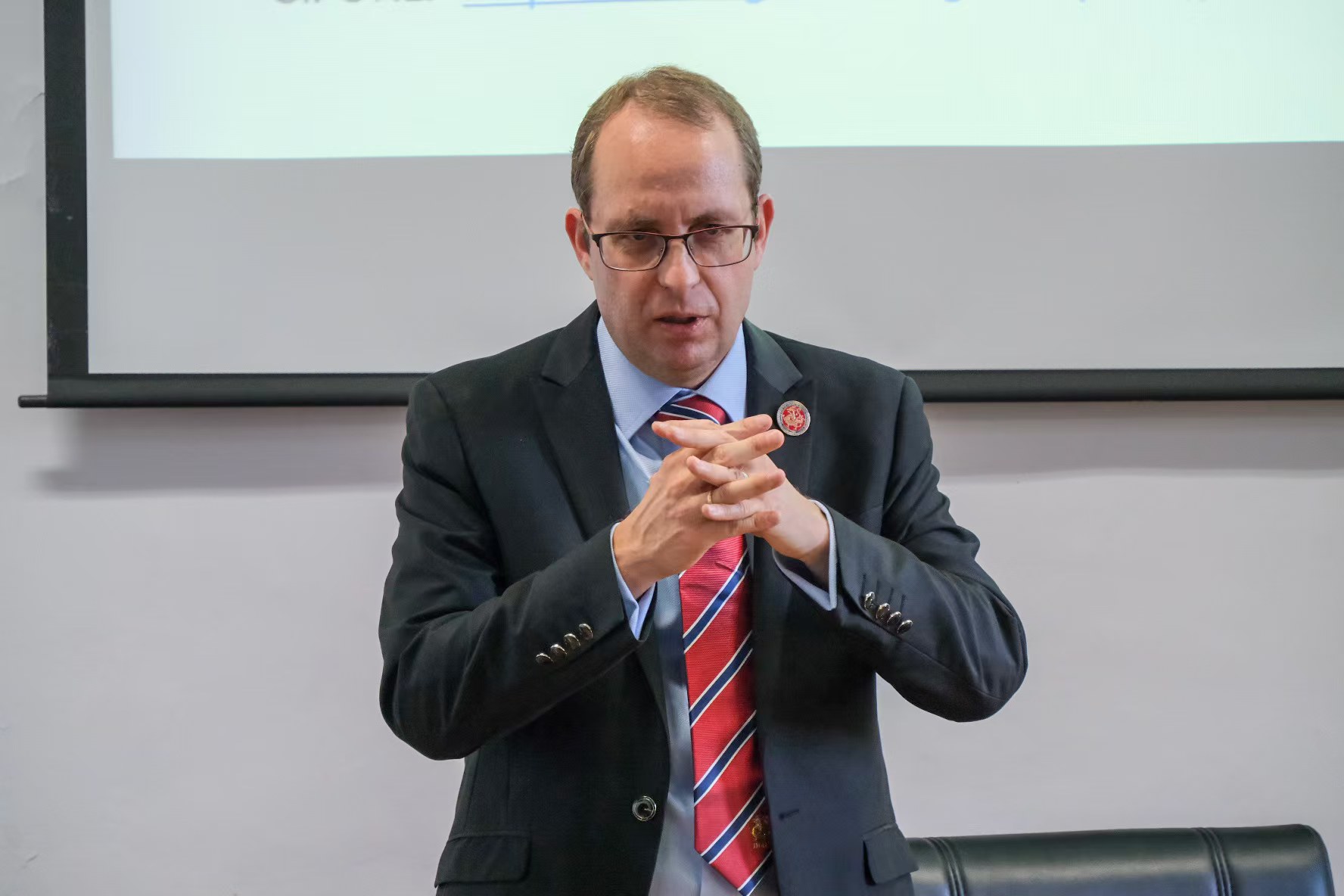
Prof. Dr. Sven Günther
Vice Direct of IHAC
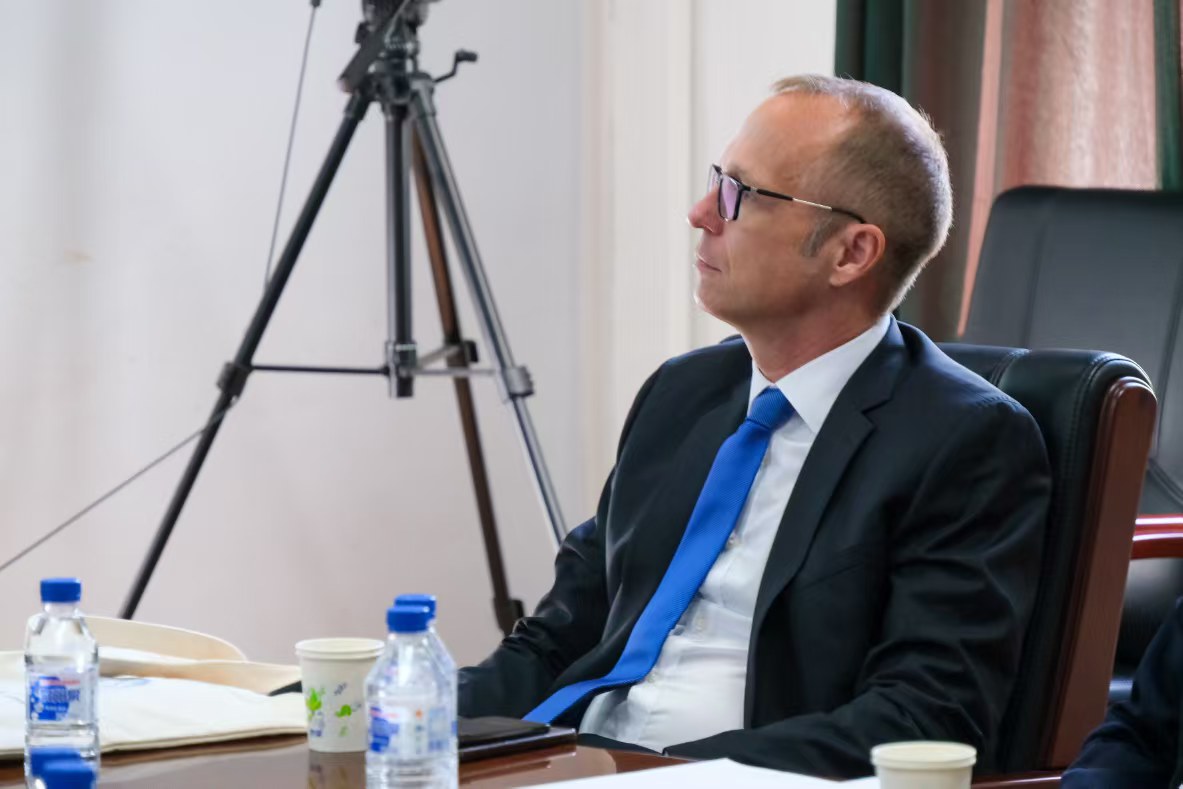
Hendrik Barkeling
Consul-General of BRD in Shenyang
Sponsorship
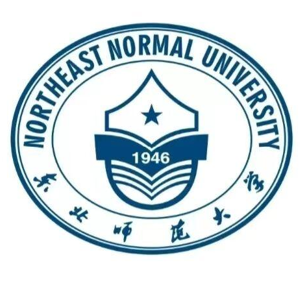
Northeast Normal University
Funding Program for Higher Level Academical Communications

Generalkonsulat der Bundesrepublik Deutschland, Shenyang
General Consulate of Germany, Shenyang
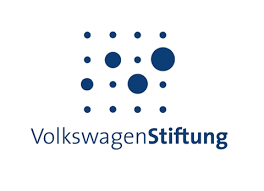
Volkswagen-Stiftung
Project “Craveler / Copter”
